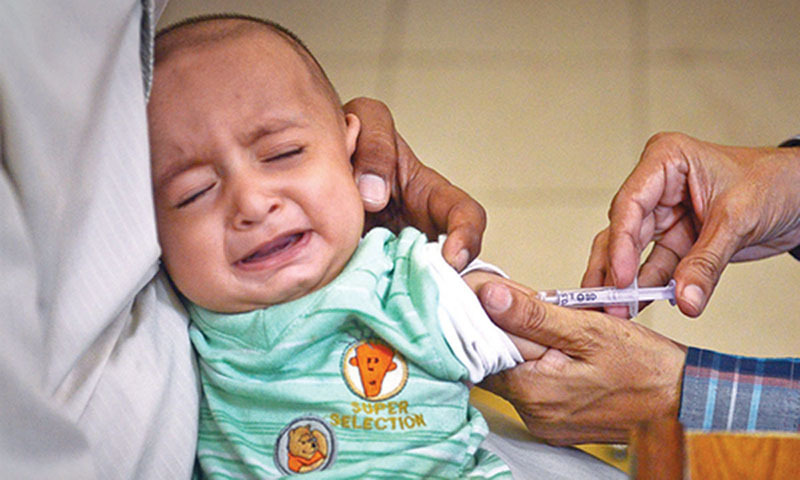By Suleman Chauhdhary
In 2022, an estimated 1.1 million children missed their first dose of the measles vaccine in Pakistan, placing the country among the ten nations with the highest measles vaccination gap. A new report from the World Health Organization and the US Centers for Disease Control and Prevention (CDC) reveals.
The new published report also ranked Pakistan as one of the 37 countries that faced measles outbreak last year.
Following years of declines in measles vaccination coverage, measles cases in 2022 have increased by 18%, and deaths have increased by 43% globally (compared to 2021). This takes the estimated number of measles cases to 9 million and deaths to 136 000 – mostly among children.
This report describes measles elimination progress during 2000–2022. During 2000–2019, estimated coverage worldwide with the first dose of measles-containing vaccine (MCV) increased from 72% to 86%, and then declined to 81% in 2021 during the COVID-19 pandemic, representing the lowest coverage since 2008. In 2022, first-dose MCV coverage increased to 83%.
Only one half (72) of 144 countries reporting measles cases achieved the measles surveillance indicator target of two or more discarded cases per 100,000 population in 2022. During 2021–2022, estimated measles cases increased 18%, from 7,802,000 to 9,232,300, and the number of countries experiencing large or disruptive outbreaks increased from 22 to 37. Estimated measles deaths increased 43% during 2021–2022, from 95,000 to 136,200.
Nonetheless, an estimated 57 million measles deaths were averted by vaccination during 2000–2022. In 2022, measles vaccination coverage and global surveillance showed some recovery from the COVID-19 pandemic setbacks; however, coverage declined in low-income countries, and globally, years of suboptimal immunization coverage left millions of children unprotected.
There were still 33 million children who missed a measles vaccine dose: nearly 22 million missed their first dose and an additional 11 million missed their second dose. The global vaccine coverage rate of the first dose, at 83%, and second dose, at 74%, were still well under the 95% coverage with two doses that is necessary to protect communities from outbreaks.
In 2022, the 21.9 million infants who did not receive MCV1 through routine immunization services represented a decrease of 2.5 million (10%) compared with 2021, and a 2.7 million increase compared with 2019. The 10 countries with the highest number of infants who did not receive MCV1 were Nigeria (3 million), Democratic Republic of the Congo (1.8 million), Ethiopia (1.7 million), India (1.1 million), Pakistan (1.1. million), Angola (0.8 million), Philippines (0.8 million), Indonesia (0.7 million), Brazil (0.5 million), and Madagascar (0.5 million). These 10 countries accounted for 55% of all children worldwide who did not receive MCV1.
During 2000–2016, the number of reported measles cases declined 85%, from 853,479 to 132,490, corresponding to an 88% decrease in incidence, from 145 cases to 18 cases per 1 million population. During 2019, the number of reported cases (837,922) and reported measles incidence (120 per million) increased more than fivefold compared with 2016.
The number of cases then declined to 123,171 in 2021 (incidence of 17 per million) but increased 67% to 205,153 in 2022; incidence increased 71% from 17 to 29 per 1 million population from 2021 to 2022.
On the basis of the revised model for estimating measles cases and deaths and 2022 data, the estimated number of measles cases decreased 75%, from an estimated 36,463,000 in 2000 to 9,232,300 in 2022; the estimated annual number of measles deaths decreased 82%, from 772,900 in 2000 to 136,200 in 2022 (Table 2).
The estimated number of cases increased 18% and deaths increased 43% in 2022 compared with an estimated 7,802,000 cases and estimated 95,000 deaths in 2021. During 2000–2022, measles vaccination prevented an estimated 57 million deaths globally, compared with no vaccination. Assistant Professor of King Edward Medical University (KEMU) Dr Kaleem Akhtar said that measles is a highly contagious viral infection, which most commonly affects children.
While the infection itself usually causes high fever, cough, runny nose, and red rashes all over the body, complications may lead to death. He said children continue to die of complications such as swelling of the brain, pneumonia and breathing problems, and severe diarrhea and dehydration.

